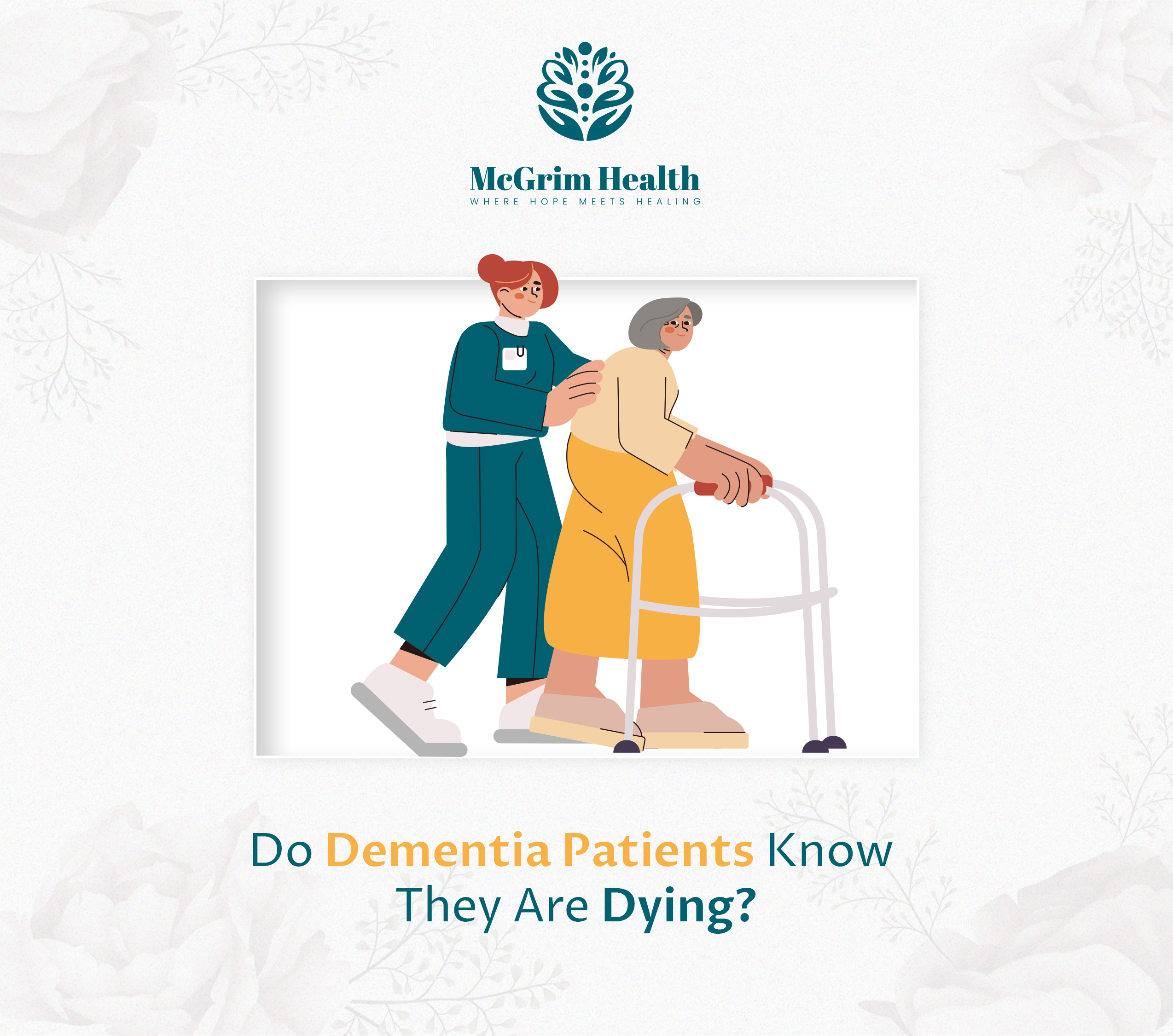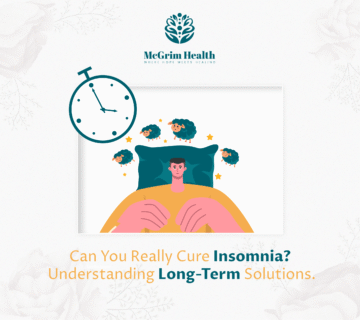Millions of people throughout the world experience dementia as a mind-altering disorder that progresses continually.
Advanced dementia causes decreasing mental abilities which results in patients having difficulty recognizing others and maintaining everyday communication.
They also struggle to comprehend their environment. Every caregiver with a dementia patient and their family and friends often thinks, “Do dementia patients know they are dying?”
Below, we will explore the awareness levels of dementia patients, “signs a dementia patient is dying”, and how caregivers can provide the best support during this difficult time.
McGrim Health provides compassionate dementia care tailored to you. We offer personalized solutions to improve your well-being. Visit our website to explore treatments that support your quality of life.
Understanding Dementia and Its Progression
Deterioration of mental ability, known as dementia, creates extensive interference when performing everyday activities. The most typical dementia form is Alzheimer’s disease, whereas another type such as vascular dementia, exists.
People experience dementia progression at different rates across three stages.
- Early-stage dementia patients go through a mild memory loss phase. They might not remember the words they want to use and may misplace things they usually need.
- As for people affected by moderate dementia, the situation is worse in terms of suffering from memory loss problems. They are unable to perform regular everyday tasks because of this challenge.
- People with severe dementia cannot communicate with others. They need care all day, every day.
Is Dementia a Terminal Illness?
The medical professionals classify dementia as a terminal condition. Statistics show that dementia alone does not lead to most mortality cases.
However, it leads to infections, aspiration pneumonia, and organ dysfunction. These can eventually be fatal.
Deteriorating brain function harms basic body functions. This makes dementia a serious and deadly illness.
Dementia follows an unpredictable path. This is unlike cancer, which provides clear predictions for patients.
The deterioration process happens over several years. It ends with a final phase that lasts weeks to months.
Are Dementia Patients Aware of Their Condition?
Dementia creates the most challenging obstacle because it disturbs patients’ self-knowledge capabilities.
At the beginning of their condition, some dementia patients consciously notice their mental deterioration which leads them to experience both worry and frustration regarding their fading memory abilities.
However, as the disease progresses, their awareness diminishes. Patient dementia progression during its later stages leads to a complete loss of self-recognition along with the inability to identify surroundings and relatives and personal identity too.
It raises an important question, do dementia patients know they are dying? Let’s explore this.
Do Dementia Patients Know They Are Dying?
Determining if dementia patients know they are dying is complex. The beginning stages of reduced abilities lead others to realize skills decline in affected patients. Their condition sometimes reveals itself clearly to them.
During progressive dementia, patients tend to lose their ability to understand what is happening to them. As the patient is in the final stages, it is very common for patients not to know what their health condition is or what death is.
According to the Alzheimer’s Society, people may become unconscious at the end of life. People in this state remain unaware of what is happening in their surroundings.
What Are the Symptoms of the Final Stages of Dementia?
Early recognition of the last phase of dementia is important for delivering correct treatment. Some signs a dementia patient is dying in its last stages include:
- Patients often feel lost and confused, making it hard to connect with loved ones. They face challenges with memory fade and can feel unsettled in their area.
- Swallowing problems and eating issues can cause weight loss and dehydration. Healthcare professionals pay close attention to these risks.
- Patient responses decrease alongside increasing sleep periods when they demonstrate withdrawal behavior. The symptoms also include extended sleep patterns.
- The person shows a restricted ability to speak through small sounds combined with facial gestures.
- The patient becomes completely immobile. They can’t move any part of their body.
- The patient has abnormal breathing. They take shallow breaths with breaks in between.
10 Signs Death Is Near in Dementia Patients
In the last days or weeks, caregivers may see these signs:
- Extreme Fatigue and Unresponsiveness: This can pass that it may stay asleep for long or short time intervals.
- Significant Weight Loss: This can likewise be explained by complications with swallowing and anorexia.
- Skin Changes: Skin color may be misdiagnosed as cold to touch in addition to its being bluish from poor circulation.
- Irregular Heart Rate: The condition of the pulse that is weak and changing blood pressure may occur.
- Labored Breathing: Gurgling sounds or pauses may occur between breaths.
- Loss of Bladder and Bowel Control: Incontinence may become more common.
- Unusual Body Temperature: Patients may have fevers or sudden drops in temperature.
- Hallucinations and Restlessness: Some may see visions of loved ones who have passed.
- Social Withdrawal: Patients may show little interest in their surroundings or people.
- Decreased Pain Response: They may struggle to express discomfort.
When Is It Time for Hospice with Dementia?
Identifying the right hospice admission period is vital. It ensures patients receive caring support during their last days. End-of-life hospice services are needed when dementia patients need care around the clock:
- Has difficulty swallowing and is losing significant weight.
- Is confined to a bed and needs help with daily tasks.
- It is often ill, for example, pneumonia or urinary tract infection (UTI) is a common infection.
- Is either unable to communicate correctly or is not as responsive to communication as it used to be.
- Has a life expectancy of less than or equal to six months, indicated by a physician’s diagnosis.
Hospice concentrates on delivering comfort to patients through non-curative care to create an environment of peace that supports patients during their last period of life.
Why Do Dementia Patients Sleep So Much?
The reduction in brain function causes dementia patients to sleep increasingly during their later stages. A progressive systems failure in the body causes greater exhaustion that requires patients to sleep more.
Do Dementia Patients Know What They Are Saying?
Patients with dementia at times may know what they are speaking but due to their cognitive decline, misunderstanding could happen. Their expressions are not always sincere thoughts or intentions.
Emotional memory continues for a while even as logical thinking decreases, but, patients need patience and empathy in communication.
How to Keep a Dementia Patient Busy?
Involving tasks can improve the life experience for dementia patients. Here are some simple questions to ask someone with dementia to encourage talk:
- “Can you talk about your early life?”
- “What was your favorite hobby?”
- “Do you remember your first job?”
Other activities include:
- Art and Crafts: Simple painting or knitting projects.
- Music: Listening to familiar songs.
- Puzzles: Easy jigsaw puzzles or matching games.
Conclusion: Do Dementia Patients Know They Are Dying?
Dementia patients gradually lose awareness of their condition, particularly in the later stages. While some may recognize their decline early on, most do not understand they are dying.
Providing compassionate care, recognizing end-of-life signs, and ensuring comfort-focused support are essential in helping dementia patients through their final days.
FAQs
Do dementia patients realize they have dementia?
A few recognize the symptoms of memory loss right at the beginning of the disease and promptly seek professional help. The ailment affects their consciousness, making them unaware of the problem. Finally, they were found to have no idea about the issue.
Why do dementia patients whisper?
Whispering may result from cognitive and speech decline, making it difficult to form words.
What stage of dementia is wanting to go home?
Desiring to “go home” is the usual occurrence in mid to late stage dementia. This particular behavior tends to manifest itself by getting confused and missing the people who are close to the patient.





No comment